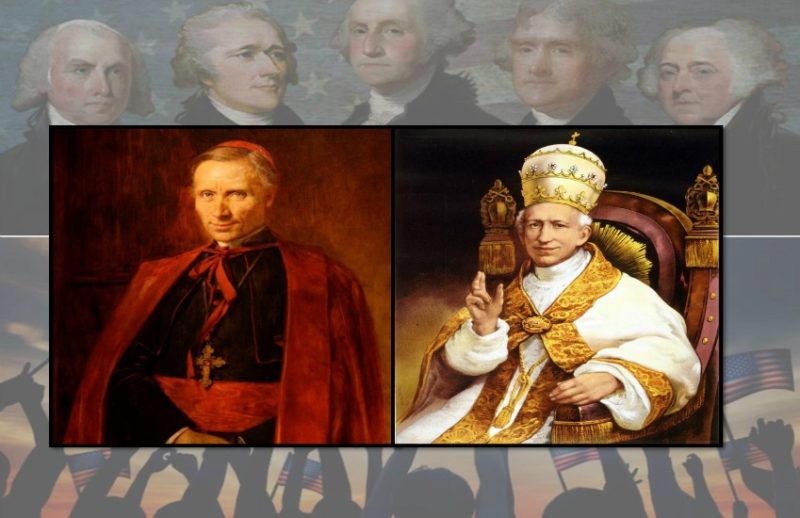Catholic Apologetics #30
The encyclical Testem benevolentiae nostrae, on the history of Americanism, was published by Pope Leo XIII on January 22, 1899. It was addressed to Cardinal Gibbons of Baltimore. And while this encyclical is unknown by the vast majority of Catholics, even American Catholics, it is nevertheless an extremely relevant document to the modern Catholic.
Much of what we are suffering from in America is the loss of our Catholic identity, and those familiar with this forgotten encyclical will see that the situation of today has been significantly affected by the cultural liberalism of American Catholics. In this document, Pope Leo XIII condemned the notion that Catholics could decide doctrine for themselves (i.e. cafeteria Catholics) and accept and reject doctrines, customs, and practices according to their own whims. The Holy Father emphasized that Catholics must obey the magisterial teachings of the Universal Church which is a universal faith that does not alter its dogmas from nation to nation.
These errors have been loosely grouped by Catholic historians and scholars under the general term of “the heresy of Americanism.” This heresy is practiced by many Catholics who have no idea they have fallen into this heresy.
Pope Leo XIII condemned the following trends:
- Undue insistence on interior initiative in the spiritual life, which leads to disobedience. He condemned the practice of putting natural virtues (e.g. hard work, persistence, and frugality) ahead of the Cardinal Virtues and the Theological Virtues, which have a supernatural element at their core. We see this error among many of America’s deist founders who rejected miracles, the nature of divine revelation, and organized religion. Instead, they emphasized hard work, loyalty, persistence, human reason, and other mere natural virtues.
- Attacks on religious vows and disparagement of the value of the contemplative religious orders in the modern world.
- Minimizing Catholic doctrine. This is especially manifested when leading Catholics refuse to speak out in public, unequivocally and with conviction. It also occurs when rank-and-file Catholics, failing to enkindle the graces of their confirmation, do not actively live, proclaim, and defend the Faith. This leads to a tendency in American social life to hide religious convictions or to think that all religions are to be respected. How much worse has this gotten in the past 100-plus years since Pope Leo XIII condemned this trend!
- Minimizing the importance of spiritual direction. This again is rooted in the tendency of the American attitude that each person is the sole arbiter of his own destiny and he does not need the priest or another person to tell him what he should do.
- Maintaining the idea that all opinions should be publicly aired. The Church, on the other hand, has always [quite reasonably] taught that speech which harms morality and the truths of the Faith has no right whatsoever to be publicly proclaimed. Whereas false religions and atheists likewise assert the First Amendment of the US Constitution as protecting their views, in reality, God does not give man the right to assert any false religious views. Error cannot have a right to exist or to be promoted. Of all religious beliefs, only the Truth in the Catholic Religion is fit to be publicly taught.
As we strive to make our fellow American Catholics aware of this condemned heresy, let us keep in mind the sentiments of Archbishop John Hughes. Back when Catholic bishops better proclaimed the Catholic Faith, Archbishop John Hughes of New York, who was Archbishop from 1842 until 1864, said: “The goal of the Catholic Church is to convert all pagan nations and protestant nations. There is no secrecy in this; it is the commission of God to His one true Church. Everyone should know that we have for our mission to convert the world, including the inhabitants of the United States; the people of the cities, the peoples of the country, the officers of the Navy and the Marines, the commanders of the Army, the Legislature, the Senate, the Cabinet, the President and all.”
[Editor’s Note: In this encyclical, Pope Leo denounces the movement known today as modernism, also roundly condemned by his successor, Pope St. Pius X. Pope Leo explains this grave error as:
“The underlying principle of these new opinions is that, in order to more easily attract those who differ from her, the Church should shape her teachings more in accord with the spirit of the age and relax some of her ancient severity and make some concessions to new opinions.”
Pope Leo notes that many are suggesting not just a change in practices and customs, but even changes in dogma, especially out of an “ecumenical” desire to attract non-Catholics. Pope Leo rightly explains that this effort is futile and correctly prophesies that such a betrayal of Christ would only lead to a weakening of the faith and a loss of Catholics. What might he say to the situation in the Church today; when so many ecclesiastical leaders have failed to heed his admonition?]
Want to read more?
Latest Catholic Apologetics




